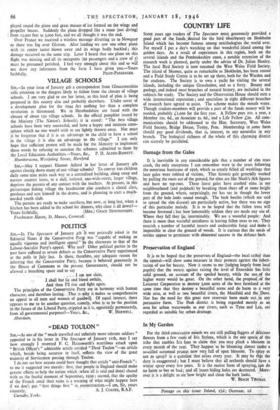VILLAGE SCHOOLS SIR,—In your issue of January 4th a correspondent
from Gloucestershire calls attention to the dangers likely to follow from the closure of village schools. I am very glad to see her letter, as this kind of plan is being proposed in this county also and probably elsewhere. Under cover of a development plan for the I944 Act nothing less than a complete revolution is threatened. We in Herefordshire are faced with the closure of about 130 village schools. In the official pamphlet issued by the Ministry (The Nation's Schools), it is stated: "The best village schools have been very successful, and have a happy and intimate atmo- sphere which no one would wish to see lightly thrown away. Nor must it be forgotten that if it is an advantage to the child to have a school
in the village it is also an advantage to the village." I can only hope that sufficient protest will be made for the Ministry to implement these words by refusing to sanction the schemes submitted to them by tbe Local Education Authorities.—Yours, &c., P. H. ALDER-BARRETT.
• Hurnberstone, West faling Street, Hereford.
SIR,—May I support Eleanor Adlard in her letter of January 4th against closing down many of our village schools? To convey too children daily some nine miles each way to a centralised building, along steep and narrow country lanes, to a dull, isolated, one-wide-street, larger village, deprives the parents of any contact with the teachers. At present, in this picturesque fishing village the headmaster also conducts a choral class, produces and acts himself in the drama, and is planning to start a much- needed youth club.
The parents are ready to make sacrifices, but now, at long last, when a kitchen has been added to the school for dinners, why close it all down?— Yours faithfully, (MRS.) GRACE MONTGOMERY. Freshwater Haven, St. Mawes, Cornwall.


























 Previous page
Previous page